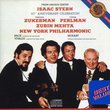| All Artists: Gustav Mahler, Herbert von Karajan, Berlin Philharmonic Orchestra Title: Gustav Mahler: Symphonie No. 9 Members Wishing: 0 Total Copies: 0 Label: Deutsche Grammophon Release Date: 10/11/1994 Genre: Classical Styles: Historical Periods, Modern, 20th, & 21st Century, Symphonies Number of Discs: 2 SwapaCD Credits: 2 UPC: 028943902427 |
Search - Gustav Mahler, Herbert von Karajan, Berlin Philharmonic Orchestra :: Gustav Mahler: Symphonie No. 9
 | Gustav Mahler, Herbert von Karajan, Berlin Philharmonic Orchestra Gustav Mahler: Symphonie No. 9 Genre: Classical
No Description Available. Genre: Classical Music Media Format: Compact Disk Rating: Release Date: 11-OCT-1994 |
Larger Image |
CD DetailsSynopsis
Product Description No Description Available. Genre: Classical Music Media Format: Compact Disk Rating: Release Date: 11-OCT-1994 Similarly Requested CDs
|
CD ReviewsOne of the greatest performances of any piece on record Stephen Chakwin | Norwalk, CT USA | 10/08/1998 (5 out of 5 stars) "I write about music, including Mahler, for American Record Guide and have known this music for more than 30 years. Yet, when I heard this recording, it was like hearing the piece for the first time. Karajan gets the spirit and life of this symphony onto discs like nobody before or since. The playing -- though not note-perfect, it was recorded in concert -- is full of intensity and beauty and the range of the piece is all there, from the halting exploration of the opening, through the wit and nostalgia of the second movement and the biting fury of the third. The finale, though, is the jewel of the performance, gorgeous and heartfelt with a fiery bridge into the closing pages, played here with a transfigured peace and deep love and optimism instead of the pathos or sentimentality of lesser performances. If you think of Mahler as a Woody Allen composer, weak and vulnerable and passive, this is not the reading for you, but if you see him as a strong, sensitive, but heroic creator, don't miss this recording." Yes, powerful in its own way Kenji Fujishima | East Brunswick, NJ USA | 05/03/2005 (5 out of 5 stars) "Mahler's Ninth Symphony is arguably both his most deeply moving and his most enigmatic. It is as if Mahler was looking back on his own life through a distorting musical mirror, seeing moments of peace and struggle along the way. (The first movement of the Ninth is all about that struggle, with peace eventually winning out.) But then, as the final quiet notes slowly die away, Mahler seems to have looked forward and accepted his impending death. In death, he finally finds a kind of spiritual peace. Lest that sound a bit too self-consciously poetic for some, I defy you to come away from this classic recording of Mahler's Ninth and not see it in a similar way---and not be deeply moved. At the very least, Herbert von Karajan, in this live 1982 recording with the Berlin Philharmonic, shows that the Ninth is not merely a tragic utterance. Leonard Bernstein often interpreted this valedictory symphony as personal tragedy; thus, in his final Royal Concertgebouw recording of the Ninth, he stretched that final Adagissimo nearly to the breaking point, as if he felt Mahler could not bear to let those notes go. As usual with the charismatic Bernstein, the sheer intensity of the performance---and that Concertgebouw Ninth sure was intense, especially the drawn-out concluding Adagio---disarms criticism. But, as Herbert von Karajan convincingly proves with this performance, it may not be the whole story as far as Mahler's Ninth is concerned. In Karajan's interpretation of the Adagio, there is nobility to go along with the sadness, and, as performed gloriously by the Berlin Philharmonic, it is equally moving. Karajan may not be everybody's idea of the ideal Mahler conductor. Those who learned Mahler's Ninth through Bernstein's numerous recordings might miss the expressive freedom Bernstein brought to his performances. Karajan is more content on securing beauty of sound and maintaining the musical line than necessarily transforming lives through music. But while Bernstein perhaps is a little insistent on presenting the music in a certain way, Karajan allows the music and its underlying emotions to speak for itself. And while some might argue that Mahler was never much of a subtle composer---and I wouldn't wholly disagree with that---Karajan's more modest approach still manages to pay dividends in this performance. It may not always sound like Mahler (or, at least, Bernstein's popular supercharged vision of Mahler), but it is hardly as emotionally sterile as some of its critics have made it out to be. Listen, for example, to the bitter intensity the Berlin Philharmonic brings to the work's demonic third movement; surprisingly, for all its technical perfection, it never sounds merely careful. And those strings in the final Adagio---what heartbreaking beauty! This 1982 recording of Mahler's Ninth may not be the only one you'll want to hear---Bernstein is almost never easily dismissed in Mahler, especially in his recording of the Ninth, which he saw as one of Mahler's central works, a work for our troubled times. But Karajan's noble interpretation is just as valid as Bernstein's tragic view; it is, indeed, powerful in its own way. Recommended." This is the one! Ed Luhrs | Long Island, NY USA | 11/23/2000 (5 out of 5 stars) "Karajan made two recordings of the 9th in the early 80s: this live digital one and an analog one prior to it. The analog recording is akin to a ship preparing to sail. This live performance is the final full-mast departure. What makes it preferable? Well, just to start I think of it as a triple swan-song, in that it is 1) one of Mahler's last works, 2) one of Karajan's last performances, and 3) in Bernstein's and my own estimation, one of the major works that put closure to the Romantic Era (albeit in the early part of the 20th century.)
It would indeed be a shame if, after all that, it were a bad performance. Fortunately, it shines on all fronts. There are moments of pure magic throughout. Woodwinds give rise to the fleeting gusts of spring and autumn. The brass sounds manifest shifting inward passions. The strings speak alternately of joy, sorrow, yearning for things lost, and resignation. And everywhere the music echoes the impermanence of all things. It has been said again and again that this is a symphony about death. I disagree. I think of it as a supreme affirmation of life, which incorporates serenity, celebration, nostalgia, anger, and sadness, among other feelings. Part of the whole celebration is an acknowledgment and acceptance of death. One achievement that sets this performance apart from others is the delivery of the final movement. The gradual acknowledgment and acceptance of death here is the closest representation of achieving Zen Buddhist clarity in the Western symphonic tradition. This final movement has its gusts of passion, longing for beauty, and pain, but in the end what it achieves is a supreme detachment from all things. It leaves you cold." |

 Track Listings (15) - Disc #1
Track Listings (15) - Disc #1








